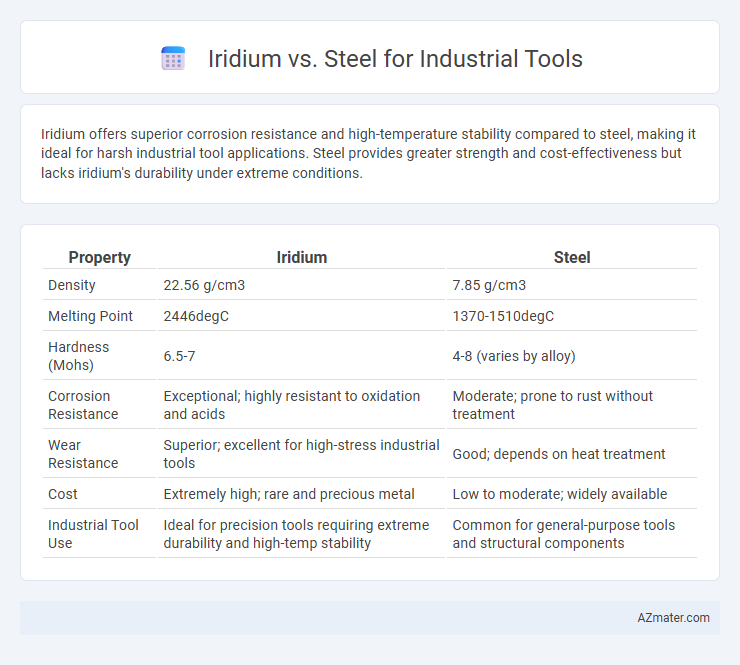Iridium offers superior corrosion resistance and high-temperature stability compared to steel, making it ideal for harsh industrial tool applications. Steel provides greater strength and cost-effectiveness but lacks iridium's durability under extreme conditions.
Table of Comparison
| Property | Iridium | Steel |
|---|---|---|
| Density | 22.56 g/cm3 | 7.85 g/cm3 |
| Melting Point | 2446degC | 1370-1510degC |
| Hardness (Mohs) | 6.5-7 | 4-8 (varies by alloy) |
| Corrosion Resistance | Exceptional; highly resistant to oxidation and acids | Moderate; prone to rust without treatment |
| Wear Resistance | Superior; excellent for high-stress industrial tools | Good; depends on heat treatment |
| Cost | Extremely high; rare and precious metal | Low to moderate; widely available |
| Industrial Tool Use | Ideal for precision tools requiring extreme durability and high-temp stability | Common for general-purpose tools and structural components |
Introduction to Iridium and Steel in Industrial Tools
Iridium, a rare and corrosion-resistant platinum-group metal, is prized for its exceptional hardness and high melting point, making it ideal for cutting and wear-resistant industrial tools. Steel, an alloy primarily composed of iron and carbon, offers versatility, strength, and cost-efficiency, widely used in manufacturing blades, drills, and structural tools. The choice between iridium and steel in industrial applications depends on the need for extreme durability and resistance versus affordability and ease of fabrication.
Material Properties: Iridium vs Steel
Iridium features exceptional hardness, high melting point (2446degC), and outstanding corrosion resistance, making it ideal for extreme industrial environments where durability and chemical stability are critical. Steel, while widely used for its versatility, strength, and cost-effectiveness, typically offers lower hardness and corrosion resistance compared to iridium, especially in harsh chemical or high-temperature applications. The choice between iridium and steel hinges on balancing iridium's superior wear resistance and thermal stability against steel's availability and mechanical flexibility.
Durability and Hardness Comparison
Iridium exhibits exceptional hardness and corrosion resistance, making it highly durable for industrial tools subjected to extreme conditions, whereas steel offers variable hardness depending on its alloy composition but generally lacks the same level of chemical stability. Iridium's superior density and wear resistance extend the lifespan of cutting and drilling instruments, reducing maintenance and replacement frequency. Steel remains a cost-effective option with good toughness, but it tends to rust and degrade faster in harsh environments compared to the nearly inert iridium.
Corrosion and Wear Resistance
Iridium exhibits exceptional corrosion resistance due to its high chemical stability and inertness, outperforming steel in harsh industrial environments. Steel, while commonly used, tends to corrode more quickly when exposed to moisture and corrosive chemicals, requiring protective coatings or treatments to enhance durability. Wear resistance of iridium is superior in high-friction applications, as its hardness and toughness reduce material degradation and extend tool lifespan compared to conventional steel options.
Cost Efficiency and Availability
Iridium industrial tools offer exceptional durability and corrosion resistance but come at a significantly higher cost compared to steel, limiting their cost efficiency for large-scale applications. Steel is more widely available and affordable, making it the preferred choice for mass production and general industrial use despite lower wear resistance. For specialized tasks requiring extreme hardness and longevity, iridium tools provide superior performance justifying the investment in niche markets.
Performance in Extreme Environments
Iridium exhibits superior corrosion resistance and hardness compared to steel, making it ideal for industrial tools operating in extreme environments such as high temperatures or corrosive chemicals. Steel, while generally tougher and more cost-effective, can suffer from oxidation and wear under harsh conditions, limiting its performance longevity. The exceptional thermal stability and chemical inertness of iridium ensure consistent tool efficiency and durability where steel tools would degrade rapidly.
Applications in Different Industries
Iridium's exceptional corrosion resistance and high melting point make it ideal for applications in aerospace, chemical processing, and medical instruments where durability under extreme conditions is crucial. Steel, with its strength and cost-effectiveness, dominates construction, automotive, and heavy machinery industries, offering versatility in structural applications and manufacturing. Industrial tools benefit from iridium in specialized environments requiring wear resistance at high temperatures, while steel remains the preferred choice for general-purpose tools due to its machinability and toughness.
Machinability and Fabrication Challenges
Iridium offers exceptional hardness and corrosion resistance but poses significant machinability challenges due to its brittleness and high melting point, often requiring specialized tools and slow cutting speeds. Steel, particularly alloyed grades, provides superior machinability with well-established fabrication techniques like welding and cutting, making it easier and more cost-effective to shape for industrial tools. Despite steel's versatility, iridium's durability under extreme conditions justifies its use in high-precision applications despite fabrication complexities.
Environmental and Safety Considerations
Iridium and steel differ significantly in environmental impact and safety considerations for industrial tools. Iridium, being a rare and dense precious metal, offers exceptional corrosion resistance and longevity, reducing tool replacement frequency and waste generation. Steel, while more abundant and recyclable, may require coatings or treatments to prevent rust, which can involve the use of potentially hazardous chemicals impacting worker safety and environmental health.
Choosing the Right Material for Industrial Tools
Iridium offers exceptional hardness and corrosion resistance, making it ideal for industrial tools exposed to extreme wear and harsh environments. Steel, particularly high-carbon or alloy variants, provides superior toughness and flexibility at a more economical cost, suitable for general-purpose tools requiring impact resistance. Selecting the right material depends on balancing durability, cost, and application-specific demands, with iridium favored for precision tools and steel preferred for versatile, heavy-duty operations.

Infographic: Iridium vs Steel for Industrial Tool
 azmater.com
azmater.com